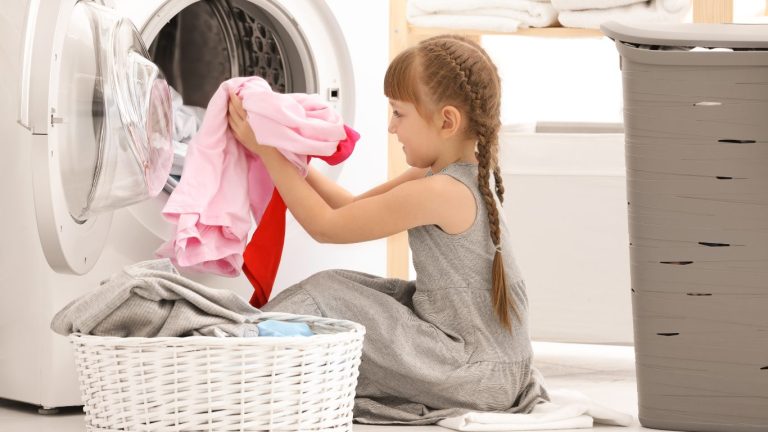As a mother of two energetic girls, now aged 5 and 9, I vividly remember the day I decided it was time to introduce them to chores. Picture this: the living room floor was an explosion of toys, glitter from an art project, and snack crumbs that seemed to have a life of their own. I stood there, hands on my hips, wondering how on earth my once-tidy home had transformed into a colorful disaster zone.
Then it hit me like a bolt of lightning—if they were capable of creating this chaos, surely they were ready to help clean it up! I called them over and, with a twinkle in my eye, proposed a “super fun clean-up game.” The giggles and cheers that followed as they raced to pick up toys filled my heart with joy. Not only were they learning responsibility, but they were also having a blast!
In this article, I’ll share my favorite tips and tricks for introducing chores to your 4-year-old. These chores are not just tasks; they’re stepping stones to building independence, self-esteem, and life skills—all while keeping the smiles wide and the laughter rolling.
Just a heads up! This post contains affiliate links, which means I may earn a small commission if you make a purchase through these links—at no extra cost to you. We only recommend products we genuinely love and think you will too. Thank you for your support!
The Importance of Chores for 4-Year-Olds
Recent research highlights the long-term benefits of assigning chores to children, showing that children who engage in household tasks are better prepared to thrive as adults. The study indicates that when kids participate in household chores, they develop essential life skills such as responsibility, teamwork, and problem-solving abilities that will serve them well into adulthood.
Building Responsibility
Chores might sound like a drag to us adults, but for a 4-year-old, they’re an adventure waiting to happen! By assigning age-appropriate tasks, you’re teaching your little one that they play an essential role in the household. When your child picks up after themselves or helps with simple chores, they begin to understand that everyone contributes to the family’s well-being.
Imagine your child proudly declaring, “I helped clean the living room!” There’s a sparkle in their eye that says they’ve accomplished something big. This feeling of responsibility lays the groundwork for accountability as they grow.
Boosting Self-Esteem
Completing a chore is a small victory for young children, and every small victory counts! When your preschooler successfully tidies up their play area or helps set the table, they’re not just doing a task—they’re building confidence.
Encourage them by celebrating their efforts, no matter how messy the outcome might be. A simple “You did an amazing job!” can send them over the moon. It’s all about making them feel proud of their contributions to the family.
Learning Life Skills
Chores are an excellent way to introduce essential life skills early on. From sorting laundry to watering plants, these tasks teach children practical skills that they’ll carry with them into adulthood.
For example, sorting laundry helps them learn about colors and categories, while washing veggies can instill an appreciation for healthy eating. The earlier they start, the more capable they become, setting them up for success in the future.
Encouraging Independence
Independence is a vital part of childhood development, and chores are a fantastic way to nurture this quality. By giving your child simple tasks to manage on their own, you’re fostering their ability to do things without constant supervision.
Next time they ask for a snack, why not let them fetch it themselves? When they’re capable of handling small chores, they gain a sense of ownership over their actions, which builds their confidence and independence.
Strengthening Family Bonds
Chores can turn into family bonding time, making them a win-win for everyone. Involving your 4-year-old in household tasks creates a sense of teamwork. You’re not just cleaning; you’re working together towards a common goal.
Imagine a Saturday morning where the whole family comes together to tidy up. It’s not just about the cleaning—it’s about laughter, shared experiences, and strengthening family ties. These moments become cherished memories that everyone will treasure.
Fun Chores for 4-Year-Olds
1. Tidy Up Toys
Let’s kick things off with a classic: tidying up toys! Turn this chore into a game by setting a timer. How many items can your little one put away before the timer goes off? The excitement of racing against time can make this task feel less like a chore and more like a fun challenge.
You can even create a reward system where they earn stickers for each completed task, leading to a small treat when they collect a certain number. Before you know it, cleaning up will become a delightful routine!
2. Dust & Wipe Low Surfaces
Dusting and wiping might not sound glamorous, but to a 4-year-old, it’s an opportunity for fun! Give them a soft cloth or a feather duster, and let them go to town on low furniture and shelves.
Not only will they feel like little cleaning superheroes, but you’ll also end up with a sparkling home. Plus, this chore can help them understand the importance of keeping their space tidy and germ-free.
3. Sort Laundry
Laundry day can become an exciting adventure! Teach your child how to sort clothes by color or type. You can even turn it into a color-matching game. For example, ask them to put all the red clothes in one pile and the blue clothes in another.
This not only teaches them valuable skills but also helps them learn about colors and categories.
4. Water Plants
If you have indoor or outdoor plants, let your little one take charge of watering them. Equip them with a small watering can, and watch as they take on the responsibility of keeping the plants healthy.
Not only does this chore nurture a sense of care and empathy, but it also introduces them to the beauty of nature. They’ll love watching their plants thrive under their care, and you’ll have a little helper in the garden!
5. Set the Table
Involve your child in meal preparation by letting them set the table. Hand them plates, utensils, and napkins, and guide them on where everything goes.
This task not only teaches them about meal etiquette but also gives them a sense of participation in family meals. They’ll beam with pride as they announce, “I set the table!” and you’ll appreciate their efforts when it’s time to eat.
6. Load/Unload the Dishwasher
Loading and unloading the dishwasher can be a fun and practical chore for your 4-year-old. Teach them how to place utensils and plastic dishes in the bottom rack.
You can turn it into a game by asking them to find specific items—like the big spoon or the small plate. Just be sure to supervise closely, especially when handling sharp objects. With a little guidance, your child will feel like a kitchen helper and learn valuable skills in the process!
7. Feed Pets
If you have pets, involving your child in their care can be a wonderful experience! Let your little one help feed the family dog or cat.
They can measure out the food and pour it into the bowl, giving them a sense of responsibility for their furry friends. This chore not only teaches them how to care for animals but also instills empathy and compassion. Plus, pets make for great partners in crime during chore time!
8. Handle Dirty Laundry
Teaching your child to handle their dirty laundry can be both fun and educational! Set up a system where they can gather their dirty clothes and place them in the laundry basket.
Encourage them to separate their clothes based on color, just like when they help with sorting laundry. This task reinforces responsibility for their belongings and can become a regular part of their routine, turning laundry day into an engaging family activity!
9. Grocery Shopping
Grocery shopping can be an exciting adventure for your 4-year-old! Involve them in the process by giving them a small shopping list and letting them help find items in the store.
You can turn it into a scavenger hunt, asking them to locate specific fruits, vegetables, or snacks. This not only teaches them about healthy choices but also helps them learn how to navigate the grocery store. Plus, they’ll feel like a big helper when they assist in loading items onto the checkout counter!
10. Emptying the Trash Cans
Emptying the trash cans is another simple yet effective chore for your pre-schooler. Teach them to recognize when the trash cans are full and need to be emptied.
Let them help take out the bag and replace it with a new one. You can turn this into a little race to see how quickly they can get the job done. This task not only instills a sense of responsibility for keeping the house tidy but also teaches them about waste management.
11. Vacuuming (Safely!)
Vacuuming can be a thrilling chore for your little one, especially if you make it safe and fun! While it’s important to handle this task with care, you can let your 4-year-old “help” by using a toy vacuum or a lightweight model designed for children.
If you have a lightweight vacuum that’s easy for them to maneuver, demonstrate how to guide it along the floor and pick up small bits of dirt or crumbs. Ensure that they stay clear of any cords and that you supervise closely to prevent accidents.
Make it even more engaging by creating a game around it. For example, challenge them to find and vacuum up as many crumbs as they can in a set time! This task not only teaches them about keeping the home clean but also introduces them to safe practices while using household appliances.
12. Preparing a Simple Meal (Like Buttered Toast)
Getting your little one involved in meal preparation can be a fun way to teach them cooking basics! Start with a simple task like making buttered toast.
Supervise them as they take slices of bread and place them in the toaster (with your help, of course!). Once the toast pops up, let them spread butter on it using a plastic butter knife. This not only helps them develop fine motor skills but also gives them a sense of accomplishment as they create their own snack.
You can even encourage creativity by offering toppings like jam or slices of banana. Making toast together is a delightful way to bond and instill confidence in the kitchen, making them excited about meal prep for years to come!
More Chore ideas:
13. Watering flowers
14. Organizing books on a shelf
15. Sorting silverware
16. Picking up leaves outside
17. Putting away groceries
18. Folding small towels
19. Arranging cushions on the couch
20. Cleaning up after a pet (like picking up toys)
21. Wiping down tables with a damp cloth, even in the bathrooms 😉
22. Helping with meal prep (washing veggies)
23. Carrying lightweight items to another room
24. Putting on socks and shoes (with guidance)
25. Helping to pack their lunch
26. Cleaning windows with a spray bottle and cloth
27. Putting away clean dishes from the dryer rack
28. Checking pantry items and letting you know what’s low
29. Making their bed (with assitance from a older sibling)
30. Picking out their clothes for the day
31. Helping to prepare a fruit salad
32. Carrying clothes to the laundry room
33. Helping to decorate for holidays or celebrations
34. Sorting and recycling paper items
35. Helping with a simple recipe (stirring ingredients)
36. Putting away shoes in the entryway
37. Organizing their art supplies
38. Helping to pack for a family outing
39. Taking their plates to the sink after meals
40. Helping to sweep the floor with a child-sized broom
41. Putting up a coat or jacket
42. Cleaning up spilled food
43. Helping to set up a game or activity
44. Checking for empty items (like tissue boxes)
45. Helping to collect items for donation
46. Picking up trash in the yard
47. Helping to wash fruits and vegetables
48. helping to Match socks from
49. Sorting through old stuff to decide what to keep or donate
50. Gathering up storybooks for bedtime
Tips for Successful Chore Implementation
Make It a Game
Transforming chores into games is a surefire way to keep your child engaged. Play upbeat music while they clean or create a scavenger hunt for items they need to tidy up.
When chores feel like a fun activity, your little one will be more inclined to participate. Their giggles and excitement will be the soundtrack to your cleaning adventures!
Use Visual Aids
Visual aids can work wonders in keeping kids motivated. Create a colorful chore chart or chore list where your child can track their completed tasks.
Use stickers or checkboxes to mark off chores as they complete them. Watching their progress visually can be incredibly rewarding, making them eager to tackle more tasks!
Offer Choices
Empowering your child with choices can increase their willingness to take on chores. Instead of dictating what they should do, ask them if they’d prefer to dust or match socks today.
When they have a say in the matter, they’re more likely to feel invested in completing the task. It’s all about making them feel like they’re in control!
Praise and Reward
Celebrating your child’s efforts is crucial for encouraging them to continue doing chores. Use enthusiastic praise when they complete a task, and consider implementing a simple reward system.
For example, you might create a sticker chart where they earn a special treat or fun activity after collecting a certain number of stickers. Positive reinforcement will keep them motivated and excited!
Be Patient and Consistent
Teaching your 4-year-old to handle chores requires patience and consistency. Keep in mind that they are still learning, and it’s okay if things don’t go perfectly.
Establishing a daily routine will help your child understand what’s expected of them. The more consistent you are, the more comfortable they’ll become with their chores, and soon it’ll become a natural part of their day.
Overcoming Common Challenges
Resistance to Chores
It’s common for children to resist chores at first. To overcome this, ensure that tasks are age-appropriate and engaging. Use playful language to make chores feel less like a burden.
If your child shows reluctance, remind them that cleaning can be fun! Offer to join them in the task, turning it into a collaborative effort.
Short Attention Spans
Young children often have short attention spans, making it challenging for them to focus on chores. Keep tasks brief and manageable to avoid overwhelming them.
If they lose interest, switch to a different chore or break the task into smaller steps. You want to keep their engagement high while teaching them valuable skills.
The Messy Factor
Let’s be real—things might get messy! Embrace the chaos as part of the learning process. It’s more important to focus on the experience and growth than achieving perfection.
Your little one will learn that it’s okay to make mistakes and that cleaning up is a valuable part of any project.
Managing Expectations
It’s crucial to manage your expectations when introducing chores to a 4-year-old. Understand that the results may not be what you envision.
Offer gentle guidance and corrections, emphasizing that the goal is to help them learn and grow. The focus should be on building their confidence and skills, not achieving perfection.
Consistency in Routine
To help your child adapt to chores, establish a routine. Regularly scheduled chores create a sense of normalcy and help them understand when to expect these activities.
Make it a part of your daily or weekly schedule, and soon enough, they’ll know what’s coming next!
Next Steps
Looking back on our journey with chores, I can’t help but smile at the delightful chaos that fills our home. My girls, now 5 and 9, have transformed into enthusiastic little helpers who take pride in their contributions. Just the other day, my youngest proudly proclaimed, “I cleaned my room all by myself!” as she twirled around, showing off her tidy space.
These moments remind me of the importance of instilling responsibility and independence in our children. So, as you embark on this adventure of introducing chores to your little ones, keep it light-hearted and fun. Celebrate their achievements, no matter how small, and enjoy the bonding experience that chores can provide.
Actionable Next Steps:
- Start with one or two simple chores that your child can manage.
- Create a colorful chore chart together to track their progress.
- Schedule a weekly family cleaning session to make it a fun cooperative effort.
FAQ Section
Q1: What are some age-appropriate chores for 4-year-olds?
A: Suitable chores include tidying up their things, dusting low surfaces, sorting laundry, watering plants, and setting the table.
Q2: How can I make chores fun for my child?
A: Turn chores into games or challenges, use visual aids like chore charts, and offer choices to keep your child engaged.
Q3: What if my child resists doing chores?
A: It’s common for children to resist chores initially. Use playful language, keep tasks short, and be patient as they learn.
Q4: How do I manage my expectations regarding the outcome of chores?
A: Remember that the goal is to teach skills, not achieve perfection. Offer guidance and corrections as needed.
Q5: How can I encourage my child to take responsibility for chores?
A: Celebrate their efforts with praise and consider implementing a reward system to reinforce positive behavior.
Related Reading
Ultimate Chore Guide: The Secret Playbook to Get Kids of All Ages Helping Around the House
Let’s be honest: getting kids to help around the house can sometimes feel like trying to herd cats. You know they can do it; you’ve seen them organize their toys, clean their plates, and even throw a few of their clothes in the laundry basket. But when it comes to tackling real chores, suddenly it’s … Continue reading
Pitfalls of tying chores to pocket money
The issues of chores and pocket money and whether there should be linkage between the two have always vexed parents. Vernon and I tried many and varied ways of dealing with both. In the end, we found one system for each that worked for the longest amount of time. Contents Page hide Should Chores and … Continue reading








